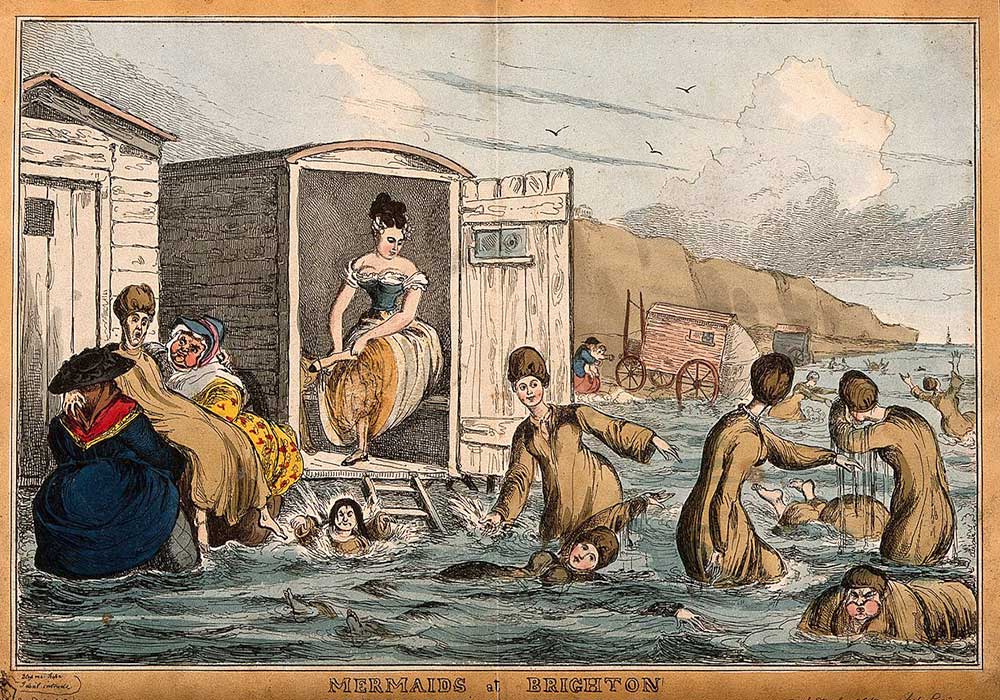Thursday
My mother’s house is about to undergo a major change that is bothering her a great deal: once the plumbers have done their work, she will switch from lake water to city water. To understand why she is upset, I turned to Matthew Bramble’s ravings about city water in Tobias Smollett’s novel Humphry Clinker.
My mother, while not prickly like Bramble, shares his suspicion. Unfortunately, her pump is 40 years old and embedded in a lake bottom that has become muddier over time. As a result, it has been sending sediment into our pipes, faucets, shower heads, and appliances. Our filtering system has not been able to keep up.
Pipe clogging has led to uneven water pressure for a while now, but a washing machine failure is what finally alerted us to the crisis. A visiting plumber showed me the assault of lake sediment on our house. We have no choice but to surrender.
Doctor-turned-novelist Smollett, my dissertation subject, seconded my mother’s preference for country water over city water. He prescribed sea baths to his patients (see picture above) and was suspicious of any water traveling through urban environments. Such views are expressed by Bramble as he journeys to Bath to both drink and bathe in its supposedly healing waters. Here’s his cranky assessment of what he finds:
Two days ago, I went into the King’s Bath, by the advice of our friend Ch—, in order to clear the strainer of the skin, for the benefit of a free perspiration; and the first object that saluted my eye, was a child full of scrophulous ulcers, carried in the arms of one of the guides, under the very noses of the bathers. I was so shocked at the sight, that I retired immediately with indignation and disgust—Suppose the matter of those ulcers, floating on the water, comes in contact with my skin, when the pores are all open, I would ask you what must be the consequence?—Good Heaven, the very thought makes my blood run cold! we know not what sores may be running into the water while we are bathing, and what sort of matter we may thus imbibe; the king’s-evil, the scurvy, the cancer, and the pox; and, no doubt, the heat will render the virus the more volatile and penetrating. To purify myself from all such contamination, I went to the duke of Kingston’s private Bath, and there I was almost suffocated for want of free air; the place was so small, and the steam so stifling.
Bramble then discovers that Bath’s legendary waters aren’t any more fit for drinking than they are for bathing:
But I am now as much afraid of drinking, as of bathing; for, after a long conversation with the Doctor, about the construction of the pump and the cistern, it is very far from being clear with me, that the patients in the Pump-room don’t swallow the scourings of the bathers. I can’t help suspecting, that there is, or may be, some regurgitation from the bath into the cistern of the pump. In that case, what a delicate beveridge is every day quaffed by the drinkers; medicated with the sweat and dirt, and dandriff; and the abominable discharges of various kinds, from twenty different diseased bodies, parboiling in the kettle below.
Leaving the public baths, Bramble heads out for the spring that supplies a private bath but finds it no better:
In order to avoid this filthy composition, I had recourse to the spring that supplies the private baths on the Abbey-green; but I at once perceived something extraordinary in the taste and smell; and, upon inquiry, I find that the Roman baths in this quarter, were found covered by an old burying ground, belonging to the Abbey; through which, in all probability, the water drains in its passage; so that as we drink the decoction of living bodies at the Pump-room, we swallow the strainings of rotten bones and carcasses at the private bath. I vow to God, the very idea turns my stomach!
Matthew does see “natural springs of excellent water” gushing from the hills, but complains that, when it gets to town, it is collected in an open basin that is
liable to be defiled with dead dogs, cats, rats, and every species of nastiness, which the rascally populace may throw into it, from mere wantonness and brutality.
Now, my mother’s problem is not exactly this. Nature herself, not humans, is mucking up her water source. She must use not only a filter but ultraviolet light to ensure that it is drinkable. Still, the symbolism of drinking from the lake is powerful.
One must take Matthew’s complaints with a grain of salt. While he does indeed suffer from gout, he is also a hypochondriac, not to mention a grumpy old man. He directs much of his venom against cities in general—not just their water—and complains about the fast pace and class intermingling.
He sees the world much differently than his niece and nephew, who revel in the crowds and commotion. Because the novel comes to us through letters written by the different characters—old and young, upper class and lower—we see vividly how different people were experiencing England’s momentous transition from a rural to an urban society.
My 93-year-old mother lives alone (or did so until we arrived) in the middle of 18 acres of thick forest, which itself is three miles from the small town of Sewanee, Tennessee. Bramble’s reflections help me understand how lake water factors into her world view and why abandoning it feels like giving up an important part of her identity.
